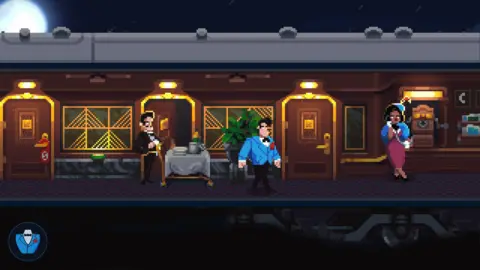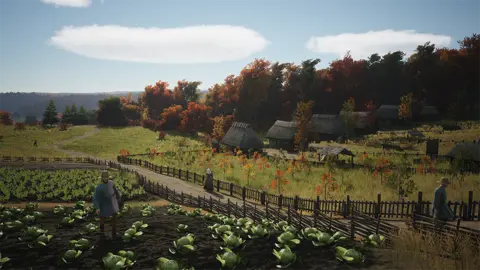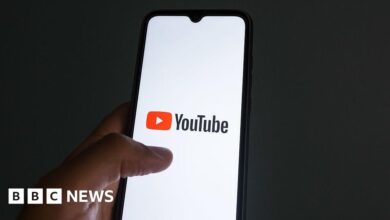Games industry in 2024: The obstacles facing indie developers

2024-11-30 06:03:59
 Adam Riches
Adam Riches“Everything is on fire at the moment,” says indie developer Adam Riches.
It’s not a controversial view, and when Adam says it he’s almost casual.
Just a fact of life these days.
Widespread lay-offs and studio closures that rocked the industry last year have continued into 2024, and the rush of investment off the back of the Covid pandemic gaming boom has slowed down.
There’s also evidence people have been spending less money on new games, choosing to stick with long-running online games like Fortnite or yearly franchises including Call of Duty and EA Sports FC.
Despite that, more games than ever are getting released.
The UK’s Digital Entertainment and Retail Association said in July that game sales had dropped sharply when compared with the same period last year.
That’s not only affected premium releases – smaller studios, whose games tend to be more affordable, have also struggled to find an audience.
It’s often difficult to pinpoint why, but quality isn’t a guarantee of success.
“You can have the best marketing, you can have the best game, you can get rave reviews, but you’re still flipping a coin as to whether it’s going to blow up,” Adam says.
He feels “discoverability” – getting players to actually find your game – is one of the biggest challenges for indie developers.
Steam, the main marketplace for PC gamers run by developer Valve, sells everything from games made in someone’s bedroom to big-budget blockbusters made by teams of hundreds.
There’s a lot of competition.
According to tracker SteamDB, more than 14,000 games have been published on the platform this year, with 2024 already overtaking 2023’s tally.
Adam’s just added another to the total. He’s released murder mystery adventure Loco Motive – a game he’s been making with his brother for the last three years.
He jokes that the best time to have put the game out was 2013 – when Steam wasn’t quite so crowded.
There are still ways to stand out – the platform recommends games based on users’ playing habits and regularly runs promotions which push a curated selection of games on to homepages.
But Adam admits it’s tough.
“We’re all competing for those same slots, and now we’re competing with triple-A and other indies,” says Adam.
 Robust Games
Robust GamesAs well as battling for player’s attention, new games are increasingly battling for their time.
According to analytics firm Newzoo, annual series such as Call of Duty and online titles such as Fortnite took up 92% of gaming time, with just 8% remaining for new releases.
Drawing players away from those established titles is extremely difficult.
The failure of Sony’s online shooter Concord – which the PlayStation maker killed just two weeks after release – has been put down to its similarity to popular titles already on the market.
Rhys Elliott, an analyst from Midia Research, suggests the big success stories of 2024 – Balatro, multiplayer shooter Helldivers II and “Pokémon with guns” Palworld – did something new and interesting.
But he accepts that’s not the only ingredient.
“Factors like a strong IP, strong marketing campaign, community fostering, and timing can help, but the fact is that there is luck involved,” he says.
“Right place, right time is a big part of gaming’s surprise successes.
“But gameplay matters, and innovation, so great games often stand out and find their market.”
 Husban Siddiqi
Husban SiddiqiAnother big issue for developers this year is finding funding.
Investment in new projects has slowed down, leading some studios behind previous indie hits to step in and fill the gap.
Among Us publisher Innersloth, for example, recently launched Outersloth – a fund to give developers a helping hand with getting their projects over the line.
Husban Siddiqi was among the first group selected by the programme for his upcoming game Rogue Eclipse.
He says Innersloth “understand the struggles” developers go through, and their support has been invaluable.
But, even with the backing of an established studio, Husban isn’t taking success for granted.
“It’s unforgiving, the speed at which things change, the technology changes, the platforms change,” he says.
“I always feel like we’re trying to study as quickly as possible before some paradigm shift happens that kind of upends whatever that conventional thinking was.”
 Snow Rui
Snow RuiManor Lords – a strategy game that puts players in charge of building a Medieval settlement.
It’s sold 2.5 million copies since its early access release in April.
Snow Rui, co-founder of publisher Hooded Horse, puts the game’s success down to the spin it puts on the genre by allowing players to inhabit and walk around the settlements they create.
Manor Lords generated huge pre-release interest based on early trailers, but Snow admits that Hooded Horse was still surprised by its reception.
“It would almost be arrogant not to be taken aback by how successful it turned out to be,” she says.
Snow says one the best pieces of advice she got was “don’t roll too fast” once you’ve found success.
Some of the wider industry’s problems have been blamed on companies expanding too quickly when gaming profits ballooned during the pandemic.
Snow says it’s more important to her to be sustainable over the long-term, and be realistic with your expectations.
“A breakout hit like this, you cannot count on it to repeat itself year after year,” she says.
“There will be people pushing you to have a different expectation or treating the next year as a failure if the breakout hit doesn’t repeat itself but that’s simply not the case.
“So that’s a matter of setting your expectations and centering who you are.”
 Slavic Magic
Slavic MagicEveryone would like to publish the next Manor Lords or the next Balatro, but Adam says “success” doesn’t have to involve blockbuster-level sales for an indie.
“Our game doesn’t cost that much to make, and because it’s mostly been me and my brother and a few freelancers, the cost is not that high,” he says.
And, Adam says, it’s about doing what you can to give your game the best chance – Loco Motive’s big marketing push was launched close to release to keep the momentum going.
It might have paid off, as the game debuted in Steam’s top-seller charts.
The odds of making a breakout hit, or even breaking even at all, are low.
But if there is a silver lining, Snow says development tools are becoming more accessible and opening the door to smaller teams with “ingenious” ideas.
“As a fan of games, this is something I’d love to see,” she says.
“Even in the current environment, there’s still plenty of room for fresh and innovative ideas.
“And that’s something I look forward to for many years to come.”






